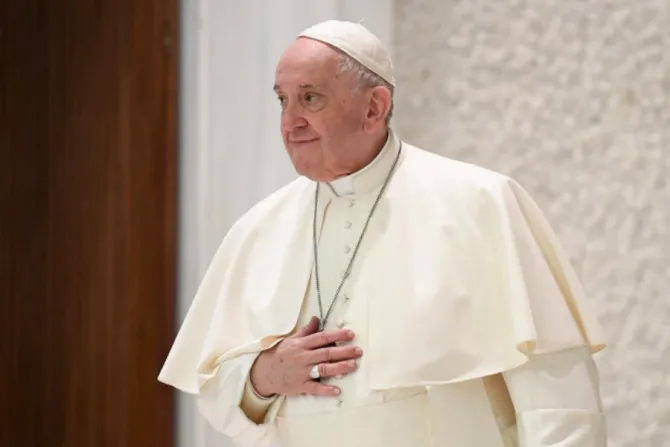Pope Francis attends the general audience in the Paul VI Hall at the Vatican, Dec. 15, 2021 | Vatican Media.
Pope Francis called for more investment in education and less in weaponry in his 2022 World Peace Day message, released today.
In the message published today, the pope said the world had witnessed a “significant reduction” in education funding in recent years, while military spending had soared beyond Cold War levels.
“It is high time, then, that governments develop economic policies aimed at inverting the proportion of public funds spent on education and on weaponry,” he wrote in the message, signed on Dec. 8, the Solemnity of the Immaculate Conception.
The World Day of Peace — instituted by St. Paul VI in 1968 — is celebrated each year on Jan. 1, the Solemnity of Mary, Mother of God. The pope provides a message for the occasion, which is sent to foreign ministers around the world.
The pope’s message for the 2022 World Day of Peace, the 55th celebration, is entitled “Dialogue between generations, education, and work: tools for building lasting peace.”
In the text, Pope Francis outlined three “paths for building a lasting peace”: promoting dialogue between generations, investing in education, and improving labour conditions.
The pope called for a new alliance between the young and elderly to address the problems of isolation and self-absorption heightened by the coronavirus pandemic.
“Although technological and economic development has tended to create a divide between generations, our current crises show the urgent need for an intergenerational partnership,” he wrote.
“Young people need the wisdom and experience of the elderly, while those who are older need the support, affection, creativity, and dynamism of the young.”
The pope expressed the hope that a new dialogue between generations could become “the driving force behind healthy politics.”
He lamented the tendency to see education and training as expenditures instead of investments. He said that they should be considered “the primary means of promoting integral human development,” because they help to shape free and responsible people.
He added that greater investment in education must be accompanied by the promotion of a “culture of care,” which could become “a common language working to break down barriers and build bridges.”
Support for education helps young people to take their rightful place in the labour market, he wrote, and build “a more habitable and beautiful world” through their work.
But he noted that COVID-19 had made it harder for the young to find stable employment.
“Millions of economic and productive activities have failed; short-term workers are increasingly vulnerable; many of those who provide essential services have an even lower public and political profile; and in many cases, distance teaching has led to a deficit in learning and delays in completing programs of study,” he said.
“Furthermore, young people entering the job market and recently unemployed adults presently face bleak prospects.”
Migrant workers, meanwhile, have been left exposed “to various forms of slavery and with no system of welfare to protect them.”
Source: CNA

